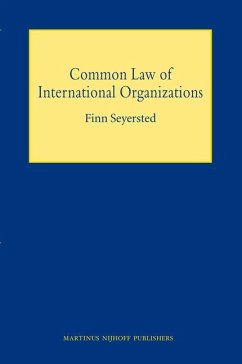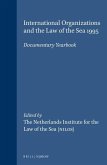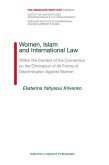This work provides a comprehensive theory of the system of legal norms that are developed partly in the internal written (constitutional) law of intergovernmental organizations and partly through their consistent practice, and that are therefore common to intergovernmental organizations.
The legal construction presented in this volume consists of the following main elements:
As for all other self-governing communities all intergovernmental organizations possess their own internal law governing their relations with 1) the organs of the organization, 2) the officials and 3) the member states in their capacity as members of the organization. Some organizations exercise in addition extended (delegated) jurisdiction over states, other organizations and/or individuals.
Secondly, as for other self-governing communities all intergovernmental organizations are subjects of public international law in their relations with other self-governing communities (states and other intergovernmental organizations), and in the case of extended jurisdiction, also in relations with individuals and private entities.
Thirdly, as for all other self-governing communities possessing its own internal law (its distinct lex personalis), intergovernmental organizations enter into relations of a private law nature with both public and private entities. Governed by the rules on conflict of laws, these relations must be determined by assessing relevant 1) personal, 2) territorial and 3) organic connecting factors.
Thus Common Law of Intergovernmental Organizations brings together all those elements pertaining to the theory of objective legal personality that have been presented in a scattered fashion, in bits and pieces.
Common Law of Intergovernmental Organizations , starting out from the position of objective legal personality, is fully compatible with modern requirements of good governance and accountability of international organizations, and particularly adaptable to the ideal of "systemic integration" of legal regimes constituting internal law of the organization.
Hinweis: Dieser Artikel kann nur an eine deutsche Lieferadresse ausgeliefert werden.
The legal construction presented in this volume consists of the following main elements:
As for all other self-governing communities all intergovernmental organizations possess their own internal law governing their relations with 1) the organs of the organization, 2) the officials and 3) the member states in their capacity as members of the organization. Some organizations exercise in addition extended (delegated) jurisdiction over states, other organizations and/or individuals.
Secondly, as for other self-governing communities all intergovernmental organizations are subjects of public international law in their relations with other self-governing communities (states and other intergovernmental organizations), and in the case of extended jurisdiction, also in relations with individuals and private entities.
Thirdly, as for all other self-governing communities possessing its own internal law (its distinct lex personalis), intergovernmental organizations enter into relations of a private law nature with both public and private entities. Governed by the rules on conflict of laws, these relations must be determined by assessing relevant 1) personal, 2) territorial and 3) organic connecting factors.
Thus Common Law of Intergovernmental Organizations brings together all those elements pertaining to the theory of objective legal personality that have been presented in a scattered fashion, in bits and pieces.
Common Law of Intergovernmental Organizations , starting out from the position of objective legal personality, is fully compatible with modern requirements of good governance and accountability of international organizations, and particularly adaptable to the ideal of "systemic integration" of legal regimes constituting internal law of the organization.
Hinweis: Dieser Artikel kann nur an eine deutsche Lieferadresse ausgeliefert werden.








